LATEST NEWS


Here’s a surprisingly little secret: You know all those dates you see on food products—sell by, use by, best before? Those dates do not indicate the safety of your food, and generally speaking, they’re not regulated.
If this is news for you, you’re not alone. In fact, according to one industry study, 90 percent of Americans at least occasionally throw food away prematurely because they mistakenly interpret the date label to mean their food is unsafe; 25 percent do so every time. In the U.K., they’ve estimated about 20 percent of food wasted in households is due to confusion over expiration dates. If this same estimate were true here, it would mean the average household of four could be spending $275-450 on discarding food that is perfectly fine, just because they misinterpret the label date.
Today, in partnership with the Harvard Food Law and Policy Clinic,
» Read more about: Misleading Food Sell-By Dates: Waste Not, Toss Not! »
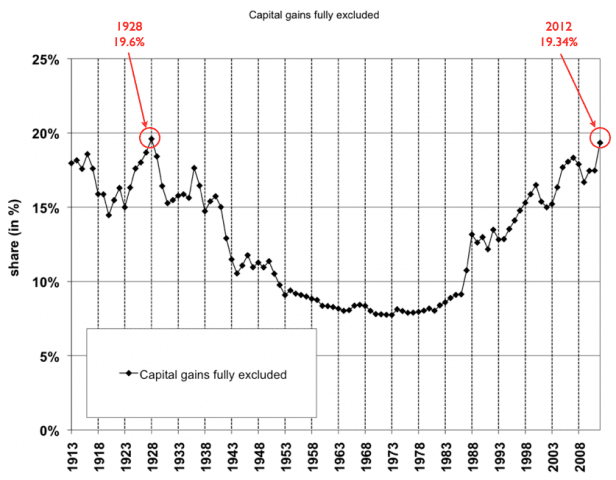
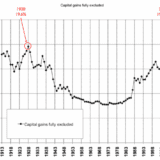
Are our rich content? It’s a question that bounces back and forth in the blogosphere. Are elites, economic and otherwise, happy with the pace of the weak recovery? Are they indifferent? Or are they actively worse off than they would be if unemployment were lower?
This question comes up when Emmanuel Saez updates his data on the incomes of the top one percent. Most of the coverage has focused on the rate of change for incomes of the top one percent, particularly the fact that the top one percent have enjoyed 95 percent of all income growth from 2009 to 2012. But I want to focus on levels. I’m going to modify one of Saez’s charts to show something I don’t think has been pointed out:
This is the percentage of all income, excluding capital gains, that goes to the top one percent.
» Read more about: Why 2012 Was the One Percent’s Favorite Year Since 1928 »


(Note: Katha Pollitt’s feature first appeared in The Nation and is republished with permission.)
Here’s a little window into poverty, American- style. According to a Yale University study published in August in Pediatrics magazine, almost 30 percent of low-income women with children in diapers can’t afford an adequate supply of them, with Hispanic women and grandmothers raising grandchildren the most likely to be in need. Some women are forced to make one or two nappies last the whole day, emptying them out and putting them back on the baby. Based on a survey of almost 900 low-income women in and around New Haven, Connecticut, investigators found the lack of diapers—such a simple thing—had profound and complex effects. The risks to children’s health are obvious: rashes, urinary tract infections, painful chafing. (If a mom is too poor to afford diapers, she probably can’t afford diaper cream or wipes or baby powder,
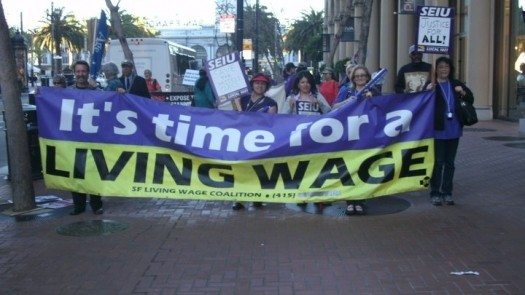
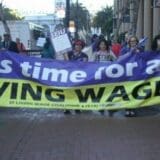
In 2004, after a long string of Republican governors and the shockingly narrow defeat of Prop. 72—which would have ushered in the most progressive health care reform ever implemented in the United States—California labor leaders got mad. And then they got organized.
“We said, we’re never going to lose that bad again—what do we have to do to change?” said California Labor Federation Executive Secretary-Treasurer Art Pulaski, who moderated [last] Wednesday’s AFL-CIO 2013 Convention panel discussion “Winning and Building Over Time: Winning in California and You Can, Too.”
The federation decided to do an extensive poll of all of their unions and labor council affiliates, asking members how they voted, who they voted for and what kinds of actions they took, and then conducting an analysis. They discovered that some unions and locals were vastly out-performing others, and that if each affiliate had carried their own weight,


Today Walmart opened its newest supermarket, a 33,000-square-foot “grocery store” on the Chinatown corner of Cesar Chavez and Grand avenues. It’s a stone’s throw from Our Lady of the Angels’ stained-glass windows and within shouting distance of dozens of small local businesses now threatened with extinction. Local community groups had fought Walmart’s arrival as a corporate intrusion into the historic neighborhood – the store represents the retail giant’s deepest penetration into urban Los Angeles yet.
For now the new store’s critics and business competitors await the worst.
“It’s just sad for a small economy like Chinatown’s to have a large national chain whose money is going out of state and not staying in the community,” says Steven Y. Wong, interim executive director of Los Angeles’ Chinese American Museum. Wong, who says that his comments are his private opinions and not those of the museum, adds that the store “drastically changes the character of the neighborhood and will have a long-term,
» Read more about: As Walmart’s Chinatown Store Opens, Questions Remain »
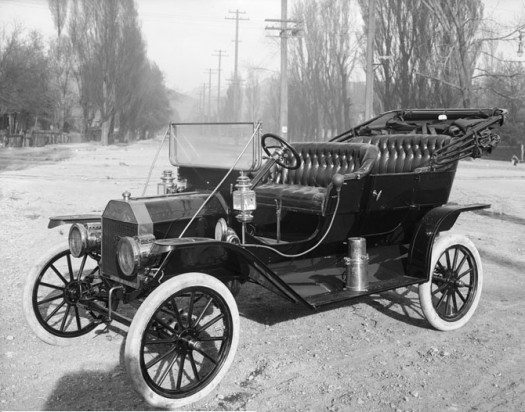
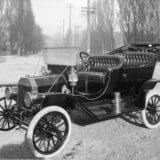
Forbes magazine, which calls itself the “capitalist tool,” seems to have a penchant for publishing right-wing diatribes posing as serious economic analyses. The latest is by Paul Roderick Gregory, who accuses me of “false facts and false theories” in a recent piece I wrote about why high wages are good for the economy.
If I’m correct, Gregory asks, how could it possibly be that America become world’s richest and most powerful economy in late nineteenth century, when the typical worker was earning peanuts?
Gregory claims to be an economic historian but he doesn’t seem to know American history. The answer is simple: Ours was a land of unbounded natural resources. We also found it relatively easy to copy the industrial advances of England and Germany, and erected a protective tariff so that our manufacturers didn’t have to compete directly with them. A giant wave of immigrants came to our shores,
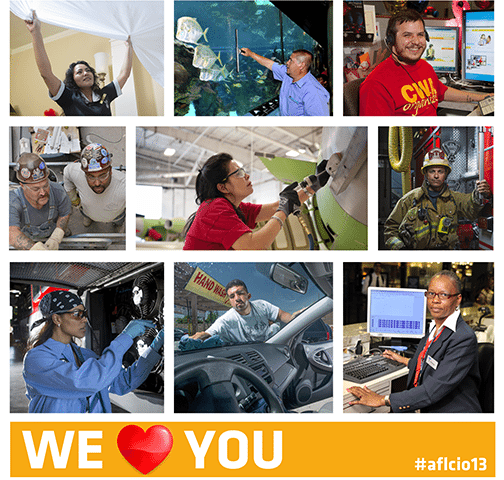

Lazy. Out of touch. Greedy. Self-serving. Thuggish.
Chances are you’ve heard a union member or leader called one of these things (and in all likelihood, more than once), and it made your blood boil. The unfortunate truth is that misconceptions, stereotypes and all-out lies seem to be dominating the public discussion and perception of labor unions, even among some progressives. We in the labor movement know that unions stand for the working class as the sole and vital counterbalance to corporate greed and excess…but no one else seems to have gotten the memo.
That disconnect—between what we actually do and what others think we do—is the impetus behind yesterday’s action session at the AFL-CIO Convention, entitled “10 Ways to Change How People See Unions.” Featuring AFL-CIO Secretary-Treasurer Elizabeth Shuler, AFSCME’s Chris Policano and Brandon Weber of Upworthy’s Workonomics, this exciting session focused on reintroducing unions to America by focusing on what we actually do every day for working families.
» Read more about: 10 Ways to Change How People See Unions »


They wake like cosmetic surgery patients.
Memories of crawling vanish
as the sun warms the body
they could not have dreamed of:
Dog Face,
Provence Chalk-Hill Blue,
Great Spangled Fritillary.
When the woman I married woke up
next to the wrong man,
that was my signal
to become inert,
await rebirth.
I want to be great,
spangled,
fritillary.
I want the caterpillar’s gift to the butterfly—
amnesia, and wings.
———————————————
Source: The poem originally appeared in Pearl and was reprinted in Amnesia and Wings, published by Tebot Bach (2013).
Photo: Derek Ramsey
Larry Colker has been co-hosting the weekly Redondo Poets reading at Coffee Cartel in Redondo Beach for more than a decade. His poems have appeared in Spillway,
See original feature by Gary Cohn, “Slash and Burn: The War Against California Pensions.”
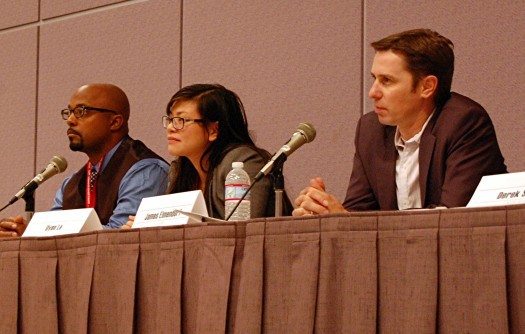

The AFL-CIO closed out its quadrennial convention in Los Angeles yesterday with a morning remembrance to the victims of 9/11 before delegates rolled up their sleeves and finished up with a day of internal housekeeping and policy chores.
The convention might be remembered most for debuting its highly popular afternoon Action Sessions. Comprising about 50 workshops and panels over three days, these sessions gathered together innovative thinkers, cutting-edge organizers and committed activists from around the country to share the lessons learned in hard-won battles to moved labor to the center stage of a 21st century economy.
Collectively they signaled the AFL-CIO’s seriousness about returning to the grass roots and leveraging one area where labor remains unrivaled and undiminished — its organizational power.
This commitment was especially clear at a Wednesday Action Session entitled “Policy Initiatives That Enable Organizing: Living Wage and PLA Campaigns.”
Moderated by James Elmendorf,
» Read more about: AFL-CIO Convention: A Tale of Two Action Sessions »


What would you do if your employer charged you a fee for everything you needed to work for them: your office desk, your computer, your phone line, your chair, your share of the water cooler and internet connection? What would you do if at the end of a week you were left with just one percent of your paycheck after all these had been deducted? How long would it take for you to stand up and refuse to keep paying to access the tools that allow you to do your work?
As you can see in the paycheck image above, that is the situation that truck drivers from the port trucking company, Pacific 9 Transportation, are facing. Drivers at Pac 9 move cargo to and from the ports of L.A. and Long Beach. The trucks they drive are leased from the company at $125 per week ($537.50 per month). In addition to the lease,
» Read more about: Port Truck Drivers Seek Millions in Owed Wages »


On a side street that runs alongside the World Trade Center, two bronze bas-relief murals depicting rescue scenes from 9/11 are affixed to a wall facing the construction site. One reads, “Dedicated to Those Who Fell and Those Who Carry On.” The other admonishes us to “Never Forget.”
When I had a chance to write my own name of the 90th floor of the new tower going up on the site of the two that were destroyed, I wrote “Remember,” underneath my name. But aside from keeping the sacrifice and bravery of those who died on 9/11 in our thoughts, what was the content of the memory that I was supposed to protect? What are those memories supposed to tell me about how to live now, how to act personally and politically in this world?
To some extent, the struggle over what would replace Ground Zero has been an argument about memory and its uses.


What happens when you grow up with a father who lost everything in the Great Depression? For Howard Sherman, you spend the rest of your life studying the causes of devastating financial collapses and how nations can avoid them.
With 22 books and more than a hundred articles, Sherman — a Visiting Scholar at UCLA and former chair of the U.C. Riverside Economics Department — is still fighting the good fight. His latest volume is Principles of Macroeconomics: Activist vs. Austerity Policies, co-written with Michael Meeropol. While the title may be dry, Sherman is anything but. In a recent interview, he offered blunt assessments of President Obama’s economic policies and why the U.S. labor movement should make full employment its highest priority.
Frying Pan News: Why did you write this book?
Howard Sherman: The main issue in economics is the distribution of income between workers and owners.
» Read more about: Economist Howard Sherman: Why Labor Should Fight for Full Employment »
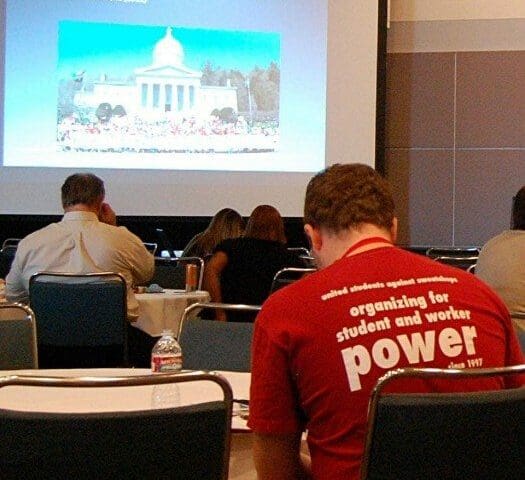
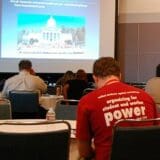
Day Three of the AFL-CIO’s quadrennial convention in Los Angeles kicked off yesterday with an address by newly minted U.S. Secretary of Labor Thomas Perez.
The Labor Secretary energized delegates by affirming the Obama administration’s support for a strong labor movement, praising the AFL-CIO’s efforts on comprehensive immigration reform and by pledging his department’s commitment to aggressively enforcing existing workplace laws.
Perez singled out the administration’s recently proposed rule to limit exposure to deadly silica dust in the workplace, saying that “it is a false choice to suggest that we can have job creation or job safety, but not both.”
He called raising the minimum wage “a moral imperative,” but admitted that despite 42 straight months of private sector job growth, job recovery overall remained disappointing, particularly for public-sector workers. “This is the first economic recovery in American history,” Perez noted, “in which government jobs haven’t come back.”
Perez’s presence marked the highest-level appearance at this convention by the Obama administration after the President last week canceled his own plans to attend the gathering,
» Read more about: AFL-CIO Day Three: Labor Sec’y Perez, Action Sessions »
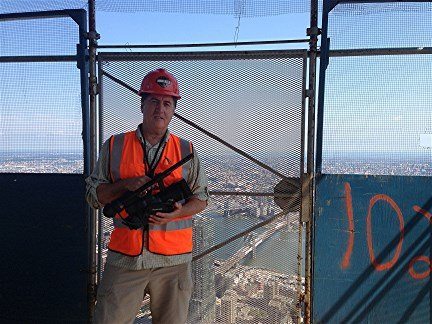

The construction elevator of One World Trade Center in Lower Manhattan is attached to the outside of the 104-story tower. From the ground it looks like a giant zipper, moving slowly up and down as the car, filled with workers and their tools, makes the six-minute, 1,776-foot journey from ground level to the top. (The building’s height was purposefully designed to match our year of independence.)
Riding up in that elevator to the 103rd floor recently, I kept myself a safe distance from the steel gates that protect you but also, unfortunately, allow you to see how high up you are hanging in space. I had to “man up” just to step into the metal box.
Phil English, a shop steward at the tower for LIUNA (Laborers’ International Union of North America), one of several unions that have members working to complete the tower, rode up with me. (See LIUNA World Trade Center videos here.) He laughed when he said he wanted to ride on the window-washing contraption attached to the outside of the top floor.
» Read more about: One World Trade Center: More Than Ground Zero »
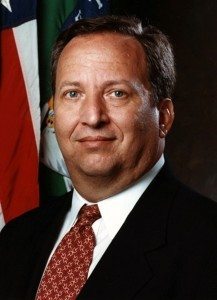

In the fall of 2011, millions of Americans were drawn to a movement directly challenging dramatically rising income inequality. The Occupy Movement dominated public discourse and put economic unfairness at the center of policy debates. Yet only two years after Occupy began on Wall Street, efforts to redress still worsening income inequality have stalled. The national grassroots campaign to get House Republicans to enact immigration reform has not been matched by similar efforts to raise the minimum wage or end corporate tax loopholes, with advocacy for such policies no stronger today than before Occupy’s emergence. We even face the prospect of President Obama selecting Lawrence Summers, a longtime backer of the One Percent, as the new head of the Federal Reserve. Are activists preoccupied with other issues, or have people decided that challenging the power of the One Percent is not a winnable political fight?
This past weekend I came across two documentaries about dramatic wealth inequality in the United States: Alex Gibney’s November 2012,
President Barack Obama was scheduled to speak this week at the AFL-CIO Convention in Los Angeles. As a delegate, I was very excited and looked forward to seeing him again. I had heard him here last summer during the 2012 presidential campaign. It was truly an unforgettable experience: He spoke to us like an organizer, sharing personal stories and pushing his base to get up and lead the next generation of progressive activism. Everyone knows he’s an incredible speaker, but to witness his strength and oratory skills in person is something immensely moving and inspiring.
Beyond that, however, our country is at a critical moment with the economy and the attempts to rebuild the middle class, and he was going to join the one and only Senator Elizabeth Warren in addressing the issues that working people struggle with every day.
(Above: President Barack Obama addresses AFL-CIO delegates via video.)
But something happened on the way to the convention.
» Read more about: AFL-CIO Convention: There’s Still Time, Mr. President »
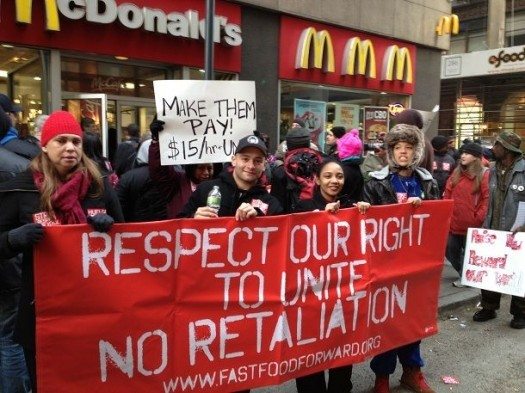
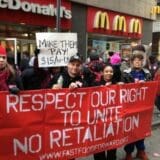
Labor Day may be over, but if the recent strikes in 60 cities are any indication, fast food workers intend to keep turning up the heat on a vast American industry built around poverty wages. For the first time, this mega-sector that grosses $200 billion a year is under serious scrutiny, as increasingly emboldened employees across the country demand a living wage from immensely profitable corporations sensitive to their public image.
While the focus on fast food workers’ paltry wages is well deserved, there’s another issue that demands attention: the rampant violation of labor laws by fast food giants.
It’s bad enough that 83 percent of workers in this industry earn less than $10.10 an hour — the average fast food cook, for example, makes $9.02 an hour or $18,760 a year — while typically being denied health insurance and other benefits. Adding injury to insult is the fact that fast food chains routinely break a wide range of laws meant to protect these workers.


September’s shaping up to be another tough month for Martha Sellers. The Walmart cashier cleared $732 on her last twice-monthly paycheck but hasn’t paid this month’s $700 rent on her place in Bellflower. When she does, she’ll have to decide how much of the remaining $32 will be divided between food and gas to get her to the job she’s held for the past 10 years.
“I am just always broke, always late on things,” Sellers says. “Thank goodness I have a nice landlord who understands.”
Sellers’ employer, however, is not so understanding. Sellers makes $13 an hour, which on paper doesn’t look too bad when compared to many other Walmart workers’ salaries, which tend to run less than $9 an hour. The problem is that the retail giant is continually cutting her hours, so that the $13 doesn’t tell the whole story.
“When I first started I worked 35,
» Read more about: Walmart Workers Fight Poverty: A Cashier’s Story »


My friend Allison is a United Methodist minister. Her husband, Andy, pastors a United Church of Christ congregation. Both serve churches in Pasadena. Both of them have been involved in advocacy for the workers at Walmart.
Allison’s father, Alan, is also a United Methodist minister and an old friend of mine who lives in Honolulu, where he took the lead to start a faith-based advocacy organization that has made a strong impact on the city. So Alan has earned some progressive credibility. Andy told me that the last time he visited his in-laws in Honolulu, Alan and he were on their way back home from a golfing excursion, when Alan announced he was going “to pick up a few things at Walmart.”
Andy was aghast and said, “You shop at Walmart?”
“Well, of course I do,” said Alan, “And don’t tell me that Allison doesn’t!”
“No, she never shops there!”
“Really?” said Alan.
» Read more about: Saying ‘No’ to Walmart’s Inhuman Resources »